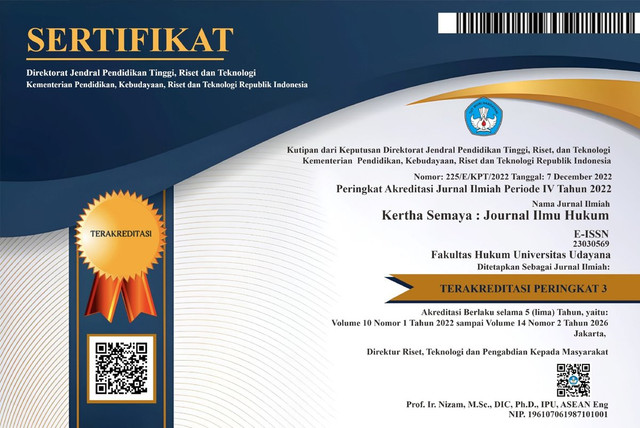RATIO LEGIS DIBENTUKNYA PERATURAN DAERAH DAN PERATURAN BUPATI TERKAIT DENGAN IDENTITAS KEPENDUDUKAN DIGITAL DALAM RANGKA MEMBERIKAN LAYANAN PUBLIK
DOI:
https://doi.org/10.24843/KS.2025.v13.i09.p02Keywords:
Ratio Legis, Regional Regulations, Digital Population Identity, Public ServicesAbstract
Penelitian ini bertujuan untuk menganalisis landasan filosofis, yuridis, dan sosiologis dibentuknya Peraturan Daerah dan Peraturan Bupati tersebut sebagai instrumen hukum yang mengatur penerapan IKD di Kabupaten Lumajang; dan mengidentifikasi hambatan serta tantangan dalam implementasi IKD sebagai sarana pendukung administrasi kependudukan guna menunjang optimalisasi pelayanan publik. Metodologi penelitian yang digunakan adalah penelitian hukum empiris dengan pendekatan yuridis-sosiologis. Jenis data yang dipergunakan meliputi data primer dan data sekunder, dengan teknik pengumpulan melalui studi dokumen, wawancara, serta observasi lapangan, kemudian dianalisis secara deskriptif kualitatif. Hasil penelitian menunjukkan bahwa ratio legis dari dibentuknya Peraturan Daerah Kabupaten Lumajang Nomor 15 Tahun 2017 dan Peraturan Bupati Nomor 53 Tahun 2023 adalah sebagai langkah konkret harmonisasi regulasi daerah dengan kebijakan nasional di bidang administrasi kependudukan. Kedua instrumen hukum tersebut berfungsi untuk menginternalisasi standar teknis yang ditetapkan dalam Undang-Undang dan Peraturan Menteri Dalam Negeri ke dalam konteks lokal, bertujuan menjamin tersedianya infrastruktur, mekanisme, serta prosedur hukum yang diperlukan bagi penyelenggaraan pelayanan publik berbasis digital di Kabupaten Lumajang. Adapun hambatan dalam implementasi IKD di Kabupaten Lumajang meliputi keterbatasan norma yang secara imperatif mewajibkan penggunaan IKD sebagai dokumen identitas sah, rendahnya integrasi dan kompatibilitas sistem teknis antarinstansi penyelenggara pelayanan publik, minimnya tingkat literasi digital di kalangan masyarakat, serta terbatasnya akses terhadap perangkat elektronik seperti smartphone. Faktor-faktor tersebut menjadi tantangan yuridis maupun sosiologis dalam mewujudkan efektivitas IKD sebagai instrumen identitas kependudukan yang sah dalam menunjang penyelenggaraan pelayanan publik.
This study aims to analyze the philosophical, juridical, and sociological foundations for the formation of Regional Regulations and Regent Regulations as legal instruments governing the implementation of IKD in Lumajang Regency; and to identify obstacles and challenges in the implementation of IKD as a means of supporting population administration to optimize public services. The research methodology used is empirical legal research with a juridical-sociological approach. The types of data used include primary and secondary data, with collection techniques through document studies, interviews, and field observations, which are then analyzed descriptively and qualitatively. The results of the study show that the ratio legis of the formation of Lumajang Regency Regulation Number 15 of 2017 and Regent Regulation Number 53 of 2023 is a concrete step towards harmonizing regional regulations with national policies in the field of population administration. These two legal instruments serve to internalize the technical standards set forth in the Law and Minister of Home Affairs Regulation into the local context, with the aim of ensuring the availability of the infrastructure, mechanisms, and legal procedures necessary for the implementation of digital-based public services in Lumajang Regency. The obstacles to the implementation of IKD in Lumajang Regency include the limitation of norms that imperatively require the use of IKD as a valid identity document, low integration and compatibility of technical systems between public service agencies, low levels of digital literacy among the community, and limited access to electronic devices such as smartphones. These factors pose legal and sociological challenges in realizing the effectiveness of the IKD as a valid identity instrument for supporting the implementation of public services.
Downloads
Published
How to Cite
Issue
Section
License
Copyright (c) 2025 Iwan Adhi Trisna, Moh. Muhibbin, Suratman

This work is licensed under a Creative Commons Attribution-NonCommercial-ShareAlike 4.0 International License.



